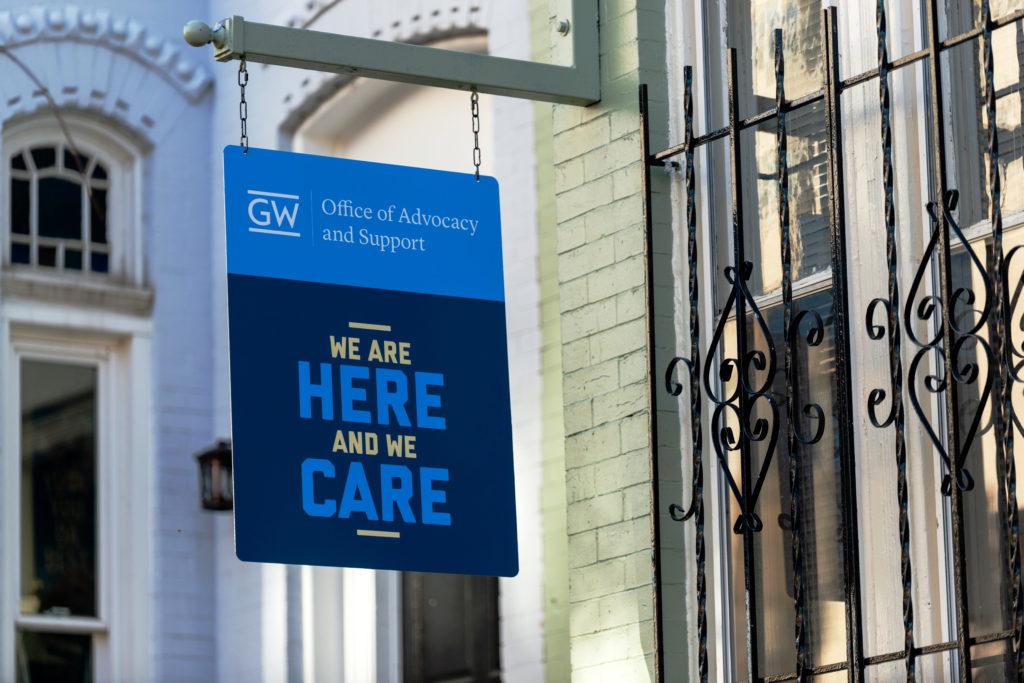A Palestinian rights advocacy organization has filed a civil rights complaint with D.C.’s Office for Human Rights against GW, alleging that the University discriminated against Palestinian students by being “selective” in its offerings of trauma services.
The organization Palestine Legal sent the complaint to officials Nov. 8 on behalf of an employee from the Office of Advocacy and Support. The complaint states that representatives from the Board of Trustees and the Office of the President called an emergency meeting on June 3 to instruct OAS to take down information about a “virtual processing space” for Palestinian students that the office had posted on its Instagram June 2 in the wake of outbreaks of violence in Gaza.
The complaint states officials communicated at the emergency meeting that University President Thomas LeBlanc was going to conduct “audit” of OAS, which could have resulted in the office’s permanent closure, depending on the audit’s results. The complaint alleges that administrators “ordered” OAS to post an apology following the emergency meeting.
The letter alleges that when Students Against Sexual Assault also attempted to host a trauma support group for Palestinian students on Instagram, they were directed to remove the post. The complaint states that SASA and OAS were told that supporting Palestinian human rights and offering support to Palestinian students was harmful to Jewish students.
University spokesperson Crystal Nosal said in a statement that the University received the complaint from Palestine Legal and will investigate the concerns.
“GW is committed toward diversity, equity and inclusion and to maintaining a nondiscriminatory work and educational environment,” she said in an email. “We have received the letter from Palestine Legal and the concerns raised there will be investigated.”
Nada Elbasha, an advocacy specialist at OAS who brought the complaint to Palestine Legal, said officials “acted in opposition” to the principles of diversity and inclusion at GW. Elbasha said the University’s alleged actions against OAS amounts to “institutional discrimination.”
“Palestinian students deserve to access the same services as any other student here – and by canceling OAS’s processing space and threatening our office, GW sent the message that they don’t care about the Palestinian community and that their healing is not important,” she said in an email.
Elbasha said she’s looking for accountability for University leaders and more Palestinian representation in the University community.
“GW offers my office’s services after incidents of violence on campus – and ultimately what I’m asking for is that Palestinians be considered in that offer as well,” she said.
Radhika Sainath, a Palestine Legal senior staff attorney handling the complaint, said senior officials implied to OAS staff that they would be fired if they did not cancel the virtual processing space.
“To this date, they have not been allowed to provide trauma services for Palestinians,” Sainath said. “And that’s unlawful. That’s a civil rights violation in this country, and in D.C., you cannot discriminate against people on the basis of their identity.”
She said the D.C. human rights office, where the complaint was filed, is expected to soon contact Palestine Legal to open an investigation.
Palestine Legal has had involvement with GW in the past. After campus police ordered a student to remove a Palestinian flag from his window in 2015, the group wrote to then-University President Stephen Knapp urging the University to allow the student to hang the flag. Knapp issued an apology to the GW community about a month later.
Sainath said she hopes to receive an apology from the University and adherence to the group’s eight demands outlined in the complaint. The demands include releasing a statement apologizing for the denial of processing services to Palestinian students, mandating a training for Office of Diversity, Equity and Community Engagement staff, creating a resource list for Palestinian students and rescheduling the virtual processing space.
Other demands include allowing OAS to operate as it did prior to the original post without censorship over healing spaces, adding an Arab or Middle East and North Africa category to the Multicultural Student Services Center webpage, recognizing Arab American Heritage month and holding a “#GWinSolidarity” event on anti-Palestinian bias and violence this academic year.
“We’re asking GW to do the right thing, apologize, reinstate services to Palestinians,” Sainath said. “Clearly a lot of people need a training on anti-Palestinian discrimination, and you can read the rest of the demands there, but we really do hope that GW will do the right thing.”








